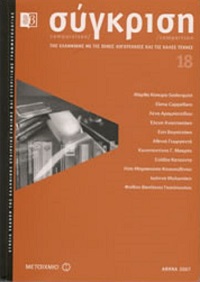Romantic Theories of Poetic Language: towards a Reconsideration of Andreas Kalvos' Odes
Abstract
Andreas Kalvos is considered one of the two greatest 19th-century Greek poets. By the time he published his two collections of Odes, in the 1820s, he had lived in Italy, London, Geneva and Paris. A pre-eminent Greek poet, he is also a great European romantic, formed in the cultural and revolutionary centres of western Europe. He was also a member of the secret society of the Carbonari and had an active role in the Italian revolution of 1820-1821. Kalvos's poetic and intellectual formation remains a mystery in Greek literary studies. The present essay focuses on the poetic language of the Odes and on the poet's intense linguistic consciousness. His archaic and highly diversified diction, combined with a very rich vocabulary, is considered within the strain of romanticism. Special references are included to the poetic diction as well as the linguistic theories of Coleridge and Byron. Kalvos had lived in London from 1816 to 1820. His indebtedness to the English Romanticism constitutes a major issue for the interpretation of his poetry. The obscure catechism and the symbolic vocabulary of the Carbonari are also taken into consideration in order to clarify the subject.
Article Details
- How to Cite
-
Γεωργαντά Α. (2017). Romantic Theories of Poetic Language: towards a Reconsideration of Andreas Kalvos’ Odes. Comparison, 18, 8–27. https://doi.org/10.12681/comparison.10287
- Issue
- Vol. 18 (2007)
- Section
- Articles

This work is licensed under a Creative Commons Attribution-NonCommercial-ShareAlike 4.0 International License.
Authors who publish with this journal agree to the following terms:
- Authors retain copyright and grant the journal right of first publication with the work simultaneously licensed under a Creative Commons Attribution Non-Commercial License that allows others to share the work with an acknowledgement of the work's authorship and initial publication in this journal.
- Authors are able to enter into separate, additional contractual arrangements for the non-exclusive distribution of the journal's published version of the work (e.g. post it to an institutional repository or publish it in a book), with an acknowledgement of its initial publication in this journal.
- Authors are permitted and encouraged to post their work online (preferably in institutional repositories or on their website) prior to and during the submission process, as it can lead to productive exchanges, as well as earlier and greater citation of published work (See The Effect of Open Access).
Downloads
Download data is not yet available.



